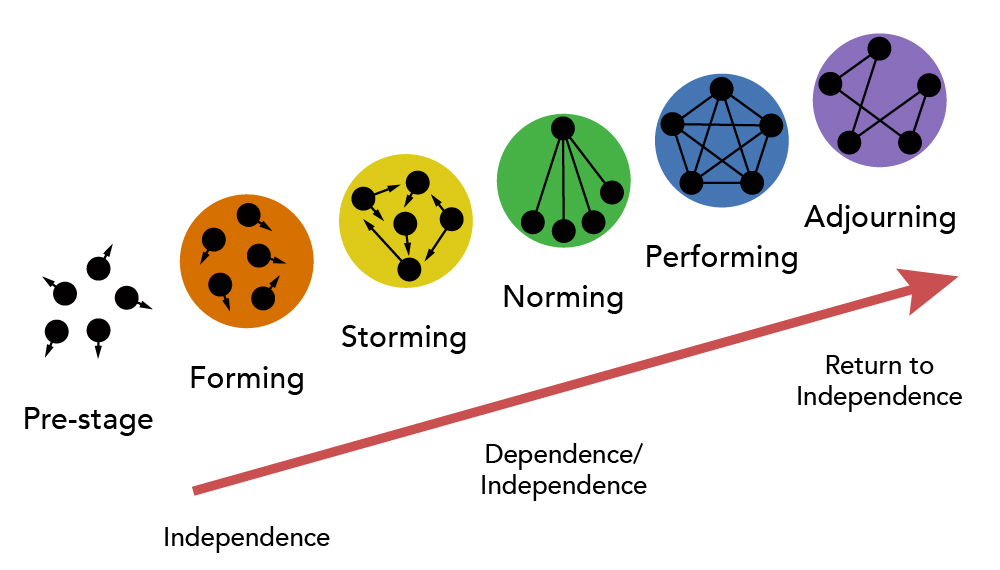5 Stages of Group Development/Team Building
.. 
Group Development Stages according to Bruce Tuckman
Initially, Tuckman identified four stages of group development, which included the stages of forming, storming, norming and performing. A fifth stage was later added by Tuckman, which is called adjourning. These 5 stages are common to all teams despite the group members’ purpose, goals, culture etc.
| Term | Definition | Key Element | Role of the Leader/Therapist | Example |
| 1. Forming
Orientation |
The first stage of group development is the forming stage. The team is formed and everyone shows their best behavior. There is a positive and polite atmosphere.
At this stage, group members are learning what to do, how the group is going to operate, what is expected, and what is acceptable. |
Participants become familiar with each other and the task. | Direction
Members look to therapist for guidance. Strong guidance is needed by the facilitator as group tasks are not clearly defined yet. |
Forming – using The Avengers as an example. |
| 2. Storming
Power Struggle |
The second stage of group development is the storming stage. The storming stage is where dispute and competition are at its greatest because now group members have an understanding of the work and a general feel of belongingness towards the group begins to develop.
This is the stage where the dominating group members emerge, while the less confrontational members stay in their comfort zone. Questions around leadership, authority, rules, policies, norms, responsibilities, structure, evaluation criteria and reward systems tend to arise during the storming stage. Such questions need to be answered so that the group can move further on to the next stage. |
Participants challenge each other and the leader. | Coaching
Members challenge the therapist
|
Storming – using The Avengers as an example. |
| 3. Norming
Cooperation and Integration |
In this stage, the group becomes fun and enjoyable. Group interaction is easier, members more cooperative and productive, there is open communication, bonding, and mutual respect.
If there is a dispute or disruption, it’s comparatively easy to be resolved and the group gets back on track.
|
Participants develop trust in each other and the leader; conflict is avoided. | Facilitation
Members are open to each other (trust). Members respect the leader’s authority and there is acceptance of the therapist’s role. Group leadership is very important, but the facilitator can step back a little and let group members take the initiative and move forward together.
|
Norming – using The Avengers as an example. |
| 4. Performing
Synergy |
Once a group is clear about its needs, it can move forward to the third stage of group development, the norming stage. This is the time where the group becomes really united.
At this stage, the morale is high as group members actively acknowledge the talents, skills and experience that each member brings to the group. A sense of belongingness is established and the group remains focused on the group’s purpose and goal. Members are flexible, interdependent, and trust each other. |
Participants work together as a cohesive unit. Conflict may be present, but it is resolved. | Delegation
Leadership is distributive and members are willing to adapt according to the needs of the group. |
Performing – using The Avengers as an example |
| 5. Reforming/ Transforming
Adjourning |
This stage of a group can be confusing and is usually reached when the task is successfully completed. At this stage, the project is coming to an end and the team members are moving off in different directions.
|
Participants reflect on their history, evaluate what went well and what did not go well, and adjust in response. | Recognition
The team is looked at from the perspective of the well-being of the team instead of the perspective of handling a team through the original four stages of team growth. |
Adjourning – using The Avengers as an example. |
.